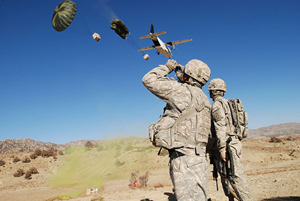The US Navy awarded two fixed-price contracts to Boeing/Frontier Systems and Lockheed Martin for their unmanned A160T Hummingbird ($29.9 million) and KMAX ($45.8 million), for Cargo Unmanned Aircraft System services in December last year. A decision is now expected some time this summer on which system to send to theatre, with an initial 6-month deployment scheduled for autumn 2011.
The decision is becoming more urgent as increasingly more supplies are being delivered by air drops in Afghanistan to save convoys from roadside bomb attacks. This method of food, fuel, water, and ammo resupply that has “doubled annually since 2006, reaching 60 million pounds of supplies last year,” according to a story in the Wall Street Journal. Army Capt. Cole DeRosa, a company commander in the 506th Infantry Regiment tells the paper that the airdrops are “our lifeline … without receiving aerial resupply, we would have no supply.”
DeRosa operates out of a small patrol base in Paktika Province, hard up against the Pakistan border, whose only road out to a supply base must pass through the Gwashta Pass, “a Taliban haven featuring steep mountainsides that offer ideal cover for ambushers”—which means that no U.S. ground convoy has used the road in two years. And it’s not just Capt. DeRosa’s unit that is being supplied from the air: twelve of the eighteen Army patrol bases in Paktika are supplied completely by air.
While unmanned lift might not be able to lift the really big loads, small patrol bases often don’t need large, manned USAF (or contractor) aircraft buzzing low and dropping satellite guided pallets when an unmanned vertical-lift platform would do just as well.
Source: Aviation Week

